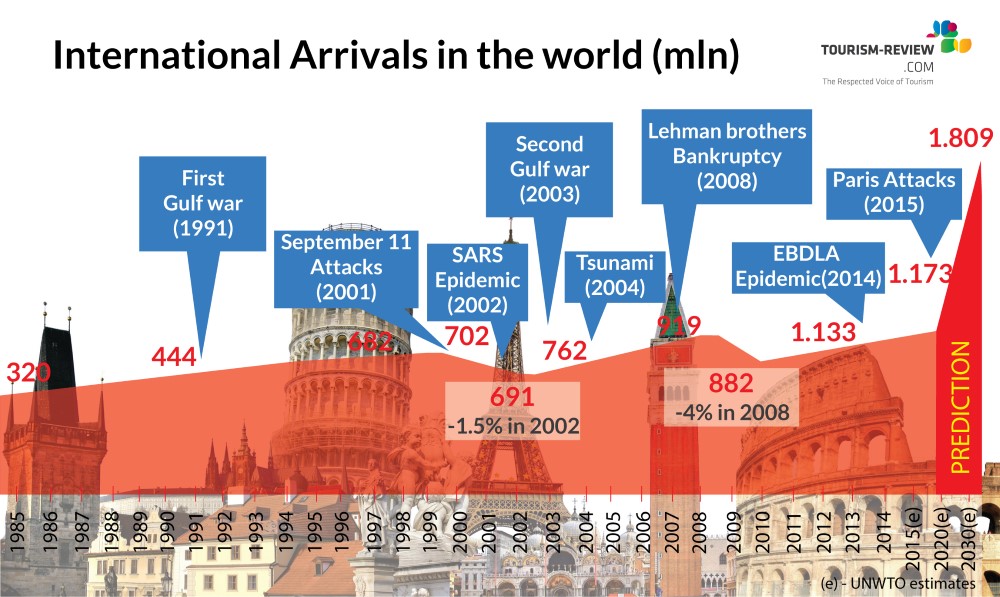Over the last two decades, a number of terrorist attacks hit various regions, often popular holiday spots. While many of them aimed at hitting western tourists in exotic countries, other sensational events, like the World Trade Center, London Underground and Madrid attack, impacted the daily lives of many Americans and Europeans at home. Naturally, all these events have affected the way people travel.
Things changed with the recent Paris attacks which targeted the daily life of common people. A new awareness awakes: terrorism is no longer confined to certain places and it cannot be avoided by simply staying away from high value targets like trains and subways. Nor is it “imported,” it actually comes next door, from western citizens or people who got accustomed to this way of life.
New Context for Tourism
Recent history shows that this new context of permanent alert has no precedent for the western citizens. Tourists, on the other hand, are more aware of security, being accustomed to careful planning and a certain degree of risk while on the road at least since 2001. Egypt and Tunisia, for instance, are well known destinations for European tourists. Despite the recent attacks, these two countries are still regularly visited.
The new escalation – even for the extreme violence and the unexpected scenarios – generates fear and caution in people. Nevertheless, experts point out that it never makes people refrain from traveling, hanging out, or changing their typical social behaviors (see the infographics below).
This also does not mean that nothing has changed or that will change in the near future. The entire phenomenon needs to be analyzed on two distinct levels: macro and micro.
Infographics

The Macro Level
On the macro, global level, the last thirty years of history teach us that wars, geopolitical crises, terrorist attacks, and natural disasters never really stopped the tourist flow. The real decline in tourism coincided with the worst economic crisis since WWII, symbolically represented by the collapse of Lehman Brothers Bank.
Apart from this sign of discontinuity – confined only to 2009 – tourism grew strong and steady over the years. Forecasts say that if trends stay the same, in 2030 there will be almost 2 billion travelers.
This positive trend is also confirmed by the World Tourism Organization (UNWTO), whose data for the first eight months of 2015 show that international arrivals increased by 4.3% compared to the previous year. The tragic events of the last part of the year had not happened yet, but it is likely the final result will not be that different.
That does not mean this climate of terror has no influence. Tourism is governed by some sort of “compensation effect”. Every time a place is perceived as dangerous or unsafe, people go somewhere they feel safer.
The Micro Level
Things change at the micro level. Terrorism has a negative effect on short-term performance, generating an “escape effect” influenced by both the events themselves and the media. Countries in North Africa are a good example. Before the "Arab Spring", Egypt in 2010 had more than 14 million international arrivals, which fell to 9.6 in 2014 (-32%); Tunisia went from 9 million arrivals in 2010 to 6 million in 2014 (-12%).
Data about the last Christmas holidays clearly show that the popular European capitals were less crowded than usual. The one which saw the worst decrease in arrivals was obviously Paris, especially with respect to Americans and Japanese. Rome was also no exception. The Catholic Jubilee declared for this year is supposed to be a very important part of the tourist offer attracting increased amounts of pilgrims to Rome. However, currently the organizers report a decrease of about 10% forecast arrivals.
Avoiding the European capitals, travelers instead explore smaller cities such as Seville, Lisbon, the Northern capitals and exotic destinations in the Caribbean, Mauritius and Maldives. France, Turkey, Tunisia and Egypt on the other hand have recorded significant decreases in arrivals.
History shows that people are not likely to stop traveling. However, tourism experts forecast that their behavior will definitely change. Tourists will probably focus more on the safety of the destinations, especially when traveling to distant holiday spots. They will also experience and get used to sudden changes in access of places and transport, with possible slowdowns even for the simplest procedures like boarding, custom control, opening times of museums etc.
Terrorist Attacks 1997-2016
November 1997: Luxor (Egypt)
September 2001: New York (USA)
October 2002: Bali Island (Indonesia)
March 2004: Madrid (Spain)
October 2004: Taba (Egypt)
April 2005: Cairo (Egypt)
July 2005: Sharm-el-Sheikh (Egypt)
July 2005: (London)
April 2006: Dahab (Egypt)
September 2013: Nairobi (Kenya)
March 2015: Tunis (Tunisia)
June 2015: Sousse (Tunisia)
October 2015: Russian airbus from Sharm-el-Sheikh (Egypt)
November 2015: Paris (France)
November 2015: Bamako (Mali)
December 2015: Derbent, Dagestan (Russian Federation)
January 2016: Hurghada (Egypt)
January 2016: Istanbul (Turkey)
January 2016: Jakarta (Indonesia)
